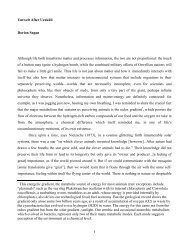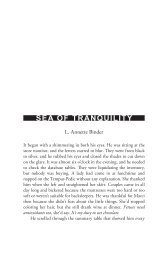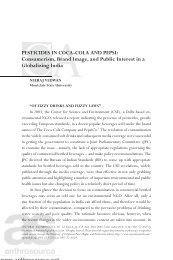The Human is More than Human - Cultural Anthropology
The Human is More than Human - Cultural Anthropology
The Human is More than Human - Cultural Anthropology
You also want an ePaper? Increase the reach of your titles
YUMPU automatically turns print PDFs into web optimized ePapers that Google loves.
Glasgow Veterinary School in Scotland reported to the Proceedings of the National<br />
Academy of Sciences that endogenous retroviruses called enJSRVs are essential for<br />
attachment of the placenta and therefore pregnancy in sheep.<br />
Like bacteria, viruses “R” us: <strong>The</strong>y have moved in to our genomes. Viral<br />
structural proteins have been “hijacked” and integrated into mammal reproductive<br />
t<strong>is</strong>sues, immune systems, and brains. Some retroviruses d<strong>is</strong>able receptors that lead to<br />
infection by other retroviruses. <strong>The</strong>re <strong>is</strong> no racial, let alone genetic purity in life. At<br />
bottom we are part virus, the offspring not just of our parents but of prom<strong>is</strong>cuous<br />
pieces of DNA and RNA. <strong>The</strong> road to humanity <strong>is</strong> paved with genetic ind<strong>is</strong>cretions and<br />
transgressions, no less <strong>than</strong> sheep would not be sheep without their acquired enJSRV.<br />
Biolog<strong>is</strong>t Margaret McFall-‐‑Ngai (2011), asked a roomful of doctors what it meant<br />
for our marine ancestors to be surrounded by all those germs—about a hundred million<br />
cells per liter. <strong>The</strong>y had no answer, but she told them: She has proposed that the<br />
immune system evolved not to eliminate pathogens but to select for symbionts in the<br />
microbe-‐‑packed waters of our metazoan ancestors. <strong>The</strong> immune system in its origin<br />
may thus be more like an employment agency, recruiting desired species, <strong>than</strong> like a<br />
national security state, recognizing and refusing entry to guard the fake purity of the<br />
Self.<br />
Today it <strong>is</strong> widely recognized that the cells of animals were once a wild party of two if<br />
not three ancient bacteria: the oxygen-‐‑po<strong>is</strong>oned archaebacteria host, the oxygen-‐‑using<br />
bacteria that became mitochondria, and perhaps wildly squirming spirochetes, which<br />
abound in anaerobic environments. <strong>The</strong>se wrigglers often penetrate their fellows, which<br />
have no immune systems. <strong>The</strong>y feed at the edges, becoming snaky motors propelling<br />
their brethren, or take up residence inside them, wiggling happily ever after.<br />
According to my mother, who’s been right before (Teresi 2011), ancient bacterial<br />
symbioses gave our ancestors the intracellular motility abilities we see in mitos<strong>is</strong>, and in<br />
the growth of undulating appendages.<br />
<strong>The</strong> creation of new symbioses by mergers on a crowded planet <strong>is</strong> called<br />
symbiogenes<strong>is</strong>. Although th<strong>is</strong> type of evolution sounds bizarre—a monstrous breach of<br />
Platonic etiquette in favor of polymorphous perversity—it <strong>is</strong> now confirmed by genetic<br />
evidence, taught in textbooks. It <strong>is</strong> a fact, or what Bruno Latour and Isabelle Stengers,<br />
not putting too fine a point on it, would call a fact<strong>is</strong>h. Nonetheless, although<br />
symbiogenes<strong>is</strong>—the evolution of new species by symbios<strong>is</strong>—<strong>is</strong> now recognized, it <strong>is</strong><br />
still treated often treated as marginal, applicable to our remote ancestors but not<br />
relevant to present-‐‑day core evolutionary processes.<br />
Th<strong>is</strong> <strong>is</strong> debatable. We are cr<strong>is</strong>scrossed and cohabited by stranger beings, intimate<br />
v<strong>is</strong>itors who affect our behavior, appreciate our warmth, and are in no rush to leave.<br />
Like all v<strong>is</strong>ible life forms, we are composites. Near unconditional hospitality <strong>is</strong><br />
necessary when we consider the sick fact<strong>is</strong>h that most of the human genome may be<br />
4






